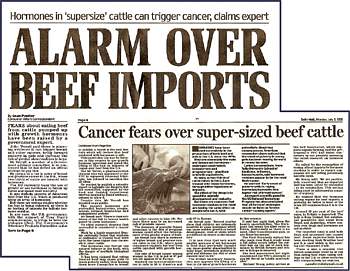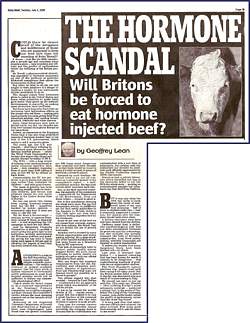One Man’s Courage Sheds Light on the True Cost of Meat-Eating
By Florida News Group (Originally in English)

On July 3rd, 2006, UK government pharmacologist John Verrall made a shocking announcement to the Daily Mail (UK). The British government, he claimed, has been deliberately covering up scientific evidence on the serious health risks of eating the flesh of cows implanted with sex hormones. The Daily Mail story spread quickly to other newspapers around the world.
Mr. Verrall, a respected scientist with 49 years experience, sits on the government's Veterinary Products Committee, which oversees hormones used by the meat industry. He was compelled to go public with the scandal after his repeated warnings to the Committee were ignored.
What was most disturbing about the allegations was that UK officials have already been exposed multiple times for covering up Mad Cow disease and other hazards of the meat industry. Award-winning journalist Geoffrey Lean proclaimed, "Could there be clearer proof of the arrogance and indifference of those who are supposed to keep our food safe than the muzzling of John Verrall?"
http://www.dailymail.co.uk/news/article-393885/Beef-scandal-shows-time-public-health-profits.html
The Horrifying Reality of Sex Hormones in Meat
Why do farmers implant sex hormones in cows? Sex hormones make cows grow muscles more quickly. Some of these hormones, which are testosterone-based, have been banned for use by athletes to build muscle mass. The other hormones are estrogen-based—these hormones shut down cows' reproductive cycles, which also causes them to build muscles faster. The results of hormone implants are dramatic: Implanted cows grow three pounds of meat per day—20% faster than naturally fed animals.
 Obviously, sex hormones are very powerful chemicals. This is precisely why they have been banned for use by athletes. Not only do they wreak havoc on the bodies of the cows in which they are implanted (which are soon slaughtered), but even a very small residue of the hormones in the meat can cause serious long-term harm to humans and other animals.
Obviously, sex hormones are very powerful chemicals. This is precisely why they have been banned for use by athletes. Not only do they wreak havoc on the bodies of the cows in which they are implanted (which are soon slaughtered), but even a very small residue of the hormones in the meat can cause serious long-term harm to humans and other animals.
Microscopic traces of these hormones have already been found throughout the ecosystem, spread by wind and water. For instance, 12% of implanted hormones pass directly from the cows into their manure, which contaminates rivers and streams. Biologists have attributed a number of defects in fish and reptiles to hormones from cow manure. In general, the defects are similar to those of human steroid users—for example, males' penises and testes shrink and females become masculine.
For the humans who eat meat with hormone residues, those most seriously at risk are children and pregnant women. The equilibrium of sex hormones in the developing body is extremely sensitive and there are many potential side-effects. These include breast, prostate, and testicular cancers and shrunken genitals in male infants.
In the US, where 90% of feedlot cattle are implanted, breast cancer rates are 45% higher and prostate cancer is more than twice that in Europe. Higher breast cancer rates are related to earlier puberty—girls in the US have their first periods almost 2 years earlier than a century ago, before the widespread use of hormones. According to Carlos Sonnenschein, from Tufts University School of Medicine in Boston, US, the most likely cause of these higher cancer rates are the hormones ingested in meat.
http://www.sciencenews.org/articles/20020105/bob13.asp
A Cover-Up
In 2002, a committee of EU scientists reviewed 17 studies on the effects of hormones in beef and concluded that there was a serious risk. For this reason, hormone implants are banned for all cattle in the EU. However, they are not banned in many countries like the US, where farmers are seeking to export cow's flesh to the EU. Officially, the EU has banned imports of meat with hormones, but it does not test imported meat, and experts believe contaminated meat still enters Europe. More importantly, the US and UK governments are now attempting to remove the ban entirely.
The mastermind of the UK government's recent change in position is a company called Monsanto, a multinational corporation which produces sex hormones. Monsanto has formed alliances with other groups in the meat industry, such as the US Cattleman's Beef Association, and together they have managed to hijack negotiations in the World Trade Organization (WTO). They are currently attempting to force the EU to legally accept meat with hormones—even though the vast majority of EU citizens strongly oppose it on grounds of both human health and animal welfare. Due to a controversial secret WTO vote forced by the US, the EU is currently required to pay the US $120 million per year to uphold this import ban. A final WTO judgment is expected in October 2006.
John Verrall, in his position on the UK government's Veterinary Products Committee, knows about Monsanto's tactics firsthand. In the past, he has exposed Monsanto's practice of giving lucrative jobs to public officials once they leave office. Now, because of the enormous pressure being exerted by Monsanto lawyers through the WTO, the Veterinary Products Committee itself has decided to oppose the EU scientists' report. This could lead to a breakdown in the EU government's opposition to imports of meat with hormones—and to imports of Monsanto's most profitable product, GMOs (genetically modified organisms).

The Illusion of the Meat Industry
All of these legal battles are carried out behind closed doors by international lawyers. According to WTO rules, the opinion of common citizens cannot influence trade policy decisions, which are supposed to be based on expert opinions. However, as John Verrall has revealed, information from the experts is being controlled by the industry. Verrall was not even allowed to include a Minority Report, a standard element in expert reports, into the Veterinary Products Committee's official government report on hormones. He and another dissenting Committee member, Professor Diana Anderson, a leading expert on the effects of hormone implants, were completely ignored. Despite the fact that Verrall has produced a large body of new evidence from numerous studies carried out in the last 2 years, which demonstrates that the health risks from hormones are much more serious than previously believed, the Committee did not consider these studies at all in its report. Verrall was therefore forced to publish his Minority Report publicly on the internet and to discredit the Committee.
Due to Verrall's heroic actions, the EU might uphold its current ban on hormones, at least until the WTO negotiations conclude. However, the hormone issue is only one battle in a much larger war being waged by the meat industry against a largely unsuspecting public. This is a war of misinformation and legal trickery, covering up the true cost of meat-eating to public health and the environment. Although public opinion towards animal welfare has changed dramatically, and the reality of the modern meat industry is well below the moral standard of society today, this reality has been covered up—wrapped in plastic packaging, as it were (please refer to The News #164, "Master Says" section, for more information). The meat industry has thus hijacked government policy and made a mockery of public health offices. But there is only so long that this deception can be sustained. Through the courage of men like John Verrall, the truth is coming to light.